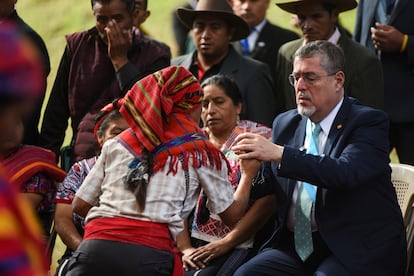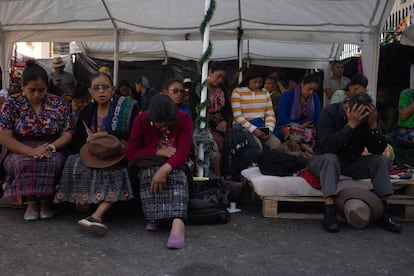Bernardo Arévalo opens governorship elections to Indigenous leaders in Guatemala
The president wants to ‘make the election transparent.’ Recognized ancestral authorities will seek to occupy the governorships for the first time

Some of the prominent Indigenous leaders who led the October protests in Guatemala are seeking to occupy the departmental governorships and be the link between the country’s executive and the municipalities for the next four years. The leaders held a historic 104-day sit-in outside the headquarters of the Prosecutor’s Office as a measure to demand the resignation of the attorney general, Consuelo Porras, and defend the election victory of President Bernardo Arévalo.
Arévalo has been in office for a month and, as part of his campaign promises to fight corruption, he decided that one of his first actions will be to make the election process for departmental governors “transparent.” In Guatemala, 22 governors and their alternates are elected every four years. They are the link between the central government and the municipalities. Until now, these people had been chosen by the president without further oversight and almost always via cronyism. But the new president has decided that the gubernatorial elections will be held under public scrutiny.
On January 29, the government published a governmental agreement with modifications to the regulations of the Urban and Rural Development Councils Law. They added three points to one of the articles to allow selection assemblies to be public with requirements that included the creation of a shortlist that will evaluate the documentation, publication of the list of candidates, and a three-day period for members of the public to present objections. Finally, the evaluation commission must choose a list of five candidates for each department (as the result of a majority vote) that will be delivered to Arévalo.
Territorial approach to development
With these changes, the councils received paperwork from 1,516 people seeking office. “It is the first time I have participated. The Indigenous authorities, motivated by the event that took place last year in the defense of democracy that culminated in stopping a coup d’état, spoke to me so that I could represent them,” Luis Pacheco, former president of the 48 Cantons, which is one of the largest Indigenous organizations in the country.

Apart from Pacheco, other leaders who stand out from the long list of candidates are Angelina Aspuac, a Kaqchikel Mayan and one of the founders of the National Movement of Weavers, and Rigoberto Juárez Mateo, an ancestral authority of the Q’anjob’al people, who was imprisoned for opposing the construction of facilities belonging to the Spanish hydroelectric company Econer Hidralia Energía, owner of Hidro Santa Cruz.
“They [the governors] preside over the Departmental Development Councils that manage around 4 billion quetzales,” about $513 million, explains Luis Linares, a Guatemalan analyst at the Social Studies Research Association. “The municipalities use the money to fund projects,” he says.
According to the expert, district deputies have, for many years, put pressure on the governors who in turn have put pressure on the mayors to “condition” the award of public works to their loved ones. “It became a source of corruption and it seems that the current government is proposing a territorial approach to meet the needs of the population and promote development,” he added.
Opposition deputies in Congress have warned that they could challenge the gubernatorial election process and have suggested that Arévalo changed the assemblies because he “agreed” with the Indigenous leaders due to the support he received during last year’s protests.
“They are wrong. It is not payment for a favor. We are complying with the procedures established by law, fulfilling the requirements that came out of the meetings. But no, it is not payment for a favor,” Pacheco responded.
When Arévalo appointed his Cabinet before his inauguration, he was criticized by Indigenous organizations that felt excluded, after only one Mayan woman occupied one of the 14 ministries. The president accepted that he lacked more representation of the Indigenous peoples, but assured them that they would occupy vice ministries and other positions in the government.
For his part, Víctor Hugo Godoy, the executive secretary of the presidency, commented in a radio interview that what is intended is to build the institutionality that “had been dismantled over 40 years.”
This week the list of candidates was made known and they are in the period of reception or presentation of objections. It is a process that will run its course in the following days. At the beginning of March, Arévalo must receive the final list of candidates, whittled down from the shortlists, in order to select the new governors.
Sign up for our weekly newsletter to get more English-language news coverage from EL PAÍS USA Edition
Tu suscripción se está usando en otro dispositivo
¿Quieres añadir otro usuario a tu suscripción?
Si continúas leyendo en este dispositivo, no se podrá leer en el otro.
FlechaTu suscripción se está usando en otro dispositivo y solo puedes acceder a EL PAÍS desde un dispositivo a la vez.
Si quieres compartir tu cuenta, cambia tu suscripción a la modalidad Premium, así podrás añadir otro usuario. Cada uno accederá con su propia cuenta de email, lo que os permitirá personalizar vuestra experiencia en EL PAÍS.
¿Tienes una suscripción de empresa? Accede aquí para contratar más cuentas.
En el caso de no saber quién está usando tu cuenta, te recomendamos cambiar tu contraseña aquí.
Si decides continuar compartiendo tu cuenta, este mensaje se mostrará en tu dispositivo y en el de la otra persona que está usando tu cuenta de forma indefinida, afectando a tu experiencia de lectura. Puedes consultar aquí los términos y condiciones de la suscripción digital.








































